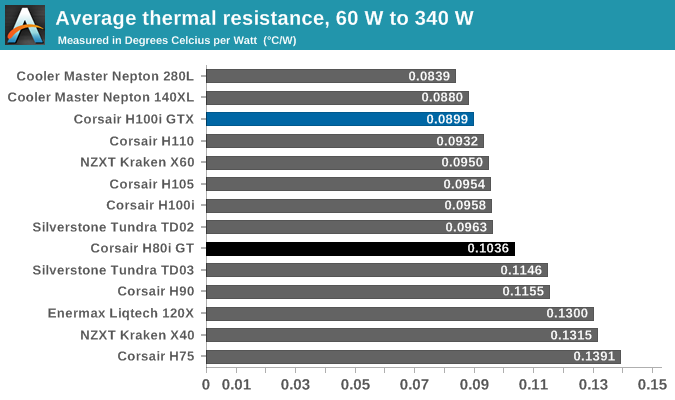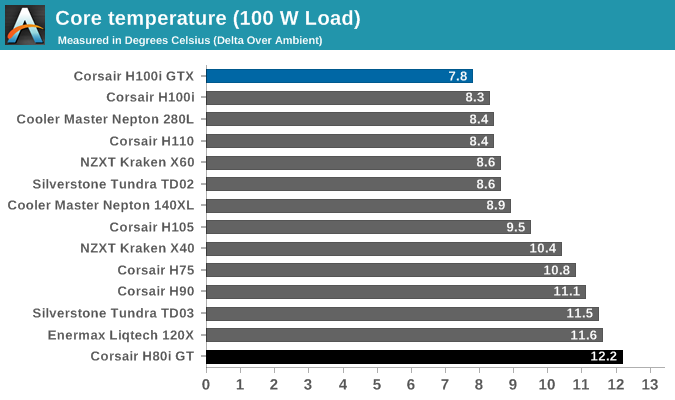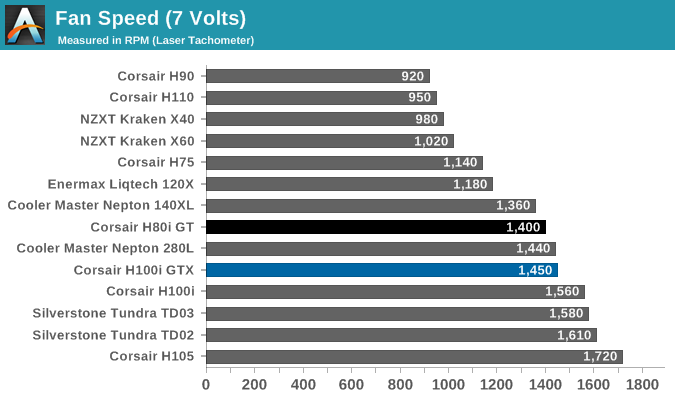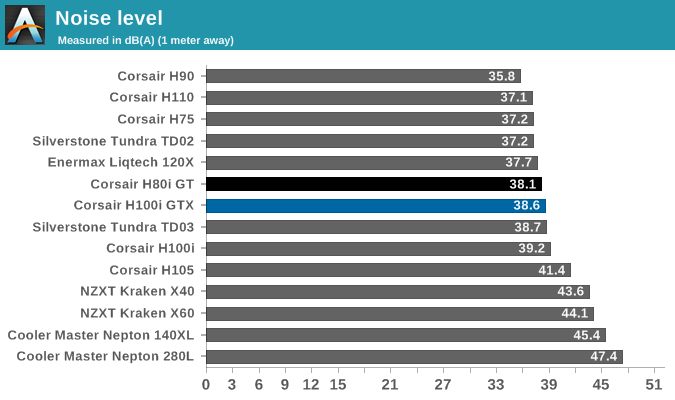The Corsair H80i GT and H100i GTX AIO Coolers Review
by E. Fylladitakis on November 16, 2015 8:00 AM EST- Posted in
- Cases/Cooling/PSUs
- Corsair
- Liquid Cooling
- Corsair Link
Testing Results, Low Fan Speed (7 Volts)
Shifting gears, let's take a look at performance with the fan speeds lowered and the fans fed at just 7 Volts.


| Core Temperature, Constant Thermal Load (Low Fan Speed) |
The H100i GTX continues to impress us when its fans and pump voltage is reduced down to 7 Volts. Once again, it displays the best low load performance of all AIO coolers. The high load performance also remains excellent, outpacing even Corsair's own H110 that is using a 280 mm radiator. Otherwise Cooler Master's models outpace the H100i GTX under heavy loads and on the average thermal resistance, but their noise output is about 8 times higher.
Not unexpectedly, the H80i GT fares better that most other similarly sized coolers when the supply voltage is reduced to 7 Volts. The low load performance is a little weak but it improves as the load increases, competing with much larger radiator AIO coolers under heavy loads. The average thermal resistance of the H80i GT is significantly better than that of similarly sized coolers and comes closer to the performance of 240/280 mm radiator coolers.


Ultimately neither the H100i GTX or the H80i GT are actually quiet when operating at 7 Volts, however the noise levels are comfortable for everyday use. The primary improvement, in our opinion, is that the whining noise of the pump is now nearly imperceptible. Even though that kind of noise would not raise the dB(A) figures by a significant amount, its high pitched frequency would be intolerable to the majority of users.










47 Comments
View All Comments
zeeBomb - Monday, November 16, 2015 - link
I came for the coolers. I wanna stay COOL.Der2 - Monday, November 16, 2015 - link
A cooling system is essential for a great PC build.ShortWicky - Monday, November 16, 2015 - link
Brilliant deduction Einstein, do go on with more glimmers of genius insightBlack Obsidian - Monday, November 16, 2015 - link
Fyll, it's possible that you've covered this before, but in cases where AIO coolers have the same heatsink/block unit as these two do, is the absolute thermal resistance essentially measuring the effectiveness of their radiators and fans, or are there other potential variables to consider?I'm guessing, for instance, that the days of significant variations in the quality of machining of the heatsink contact surface are long over? If I never have to lap another heatsink, it'll be too soon...
basroil - Monday, November 16, 2015 - link
Thermal resistance is affected by:1) Overall sink and radiator design
2) Fluid flow rate
3) Fluid type (not much change since all use basically the same thing)
4) Fan speed and efficiency
5) Mounting pressure
6) Thermal paste quality
Assuming 1-3 are identical (because of OEM designs), it's fan and paste performance and mounting pressure you see change thermal conductance
nathanddrews - Monday, November 16, 2015 - link
What AIO coolers have the quietest pumps (least whine)?rpjkw11 - Monday, November 16, 2015 - link
Nothing in this review shows a need to replace my Noctua NH-D15, cooling an i7 5960X @ 4.3 and an Asus STRIX GTX 980Ti. I'm having absolutely no problem with heat or air flow. One of these days I'll take the plunge and try a water AIO, but this ain't the day.Thanks for the great review!
shaolin95 - Monday, November 16, 2015 - link
So if "I'm having absolutely no problem with heat or air flow" then why did you read this whole thing for? ;)I much rather have an AIO for a clean look, easier to clean than a big air cooler and trust me...I used to love them! I had the D14 with 3 massive fans AND shrouds before. I started the thread for it in case you are curious how it used to look:
http://www.overclock.net/t/628569/official-noctua-...
Not saying that Air coolers are not good...the D15 is the top in my list but I prefer AIO.
Chaitanya - Monday, November 16, 2015 - link
A good air cooler is still better than most of the entry level/mid segment AIOs. AIOs have a copper heat plate and aluminium radiator, couple that with non-refillable system you might face a failed pump due to corroded metal. If you want an AIO better be ready to spend on likes of Swiftech/EKWB one as they don't mix metals together in the system and are user serviceable and expandable.Morawka - Tuesday, November 17, 2015 - link
AIO are disposable.. you use then for 3-5 years then that's it, 50% water has evaporated. You could open it up, but good luck with that.